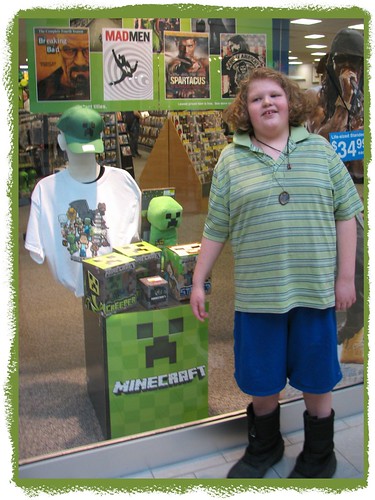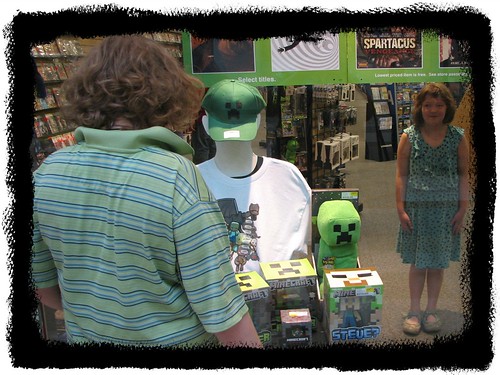It’s Monday again – and time for Coffee and Conversation.
When I was six, my family was driving on a highway late at night. Streaks of headlights and taillights painted the dark. For the first time, I realized that each car held people living lives as important to them as mine was to me.
I wanted to know what those lives were, and to share my own…
Here, each Monday, I strive to reach that understanding by offering ideas and tidbits from my life. Settle in for a while, and maybe share something of yours, too…
Recently, I read this article debating whether Minecraft was brain-rotting kid crack, or whether this open-ended and almost infinitely variable gaming experience might have educational benefits.
Touted in the article, which was mainly positive toward Minecraft, were several programs initiated by teachers who wanted to bring some educational value to the game.
- Students in one school were given gravity lessons.
- Students in a (Danish) school were free to play, but only in English.
- Some schools have instituted assigned quests for kids to work on collaboratively.
I’m all for schoolkids – everyone! – learning through play. That’s the purpose of play – to learn, by challenging ourselves.
But reading this made me sad.
My unschooled kids discovered Minecraft late last winter, and, by spring, they were both intensely engaged with the game That passion has not subsided. Minecraft is part of their daily routine.
Some adults might call this level of passion obsessive. They might fear video game addiction, impose limits, or require kids to earn their gaming time. Teachers (if they had them) might complain that Minecrafting was interfering with their studies…
I have a different perspective on my kids’ Minecrafting. I willingly make plenty of room for it, in our home and in our schedule. I listen when they tell me what they’re doing in the worlds they’ve created, and I look when invited. I can sing several Minecraft parody songs creditably well.
I don’t interfere or impose any agenda upon their play, because I believe that what they learn on their own, for their own purposes, by trial and error, experimentation, and imagination, is more valuable than any curriculum could be. I’ve seen it, over and over, in innumerable ways, since I stopped trying to direct what they learned and how they learned it.
Besides, what they come up with is deeper, richer, wider, and more diverse than anything I could have planned. Life is lived in moments and inspiration, here. I want my kids to be free to explore, and to follow their inspirations where they lead.
In the process of creating and playing, they’ve learned and used many skills valued in classrooms, and in life:
- Geographic features, mapreading, and coordinates
- Elements, compounds, and their properties
- Chemical formula and properties of TNT
- Writing and spelling
- Coding and programming
- Architecture and construction with a variety of materials
- Animal husbandry
- Collaborative play – creating worlds, working together toward common goals, figuring out how four children can play together using two Kindle Fires and two iPad Touches
- Mentoring others in aspects of games play
- Budgeting, purchasing and selling
- Interior and exterior designs of rooms, buildings, structures, dams, canals, rollercoasters, machines, and other items
- Reading
- Research on various aspects of the game, and various notable gamers
- Music- learning, singing, and composing parody songs
- Foreign languages- several of the Minecrafters they follow are native speakers of other languages, and so they are exposed to both their spoken and written forms.
- Social sciences- history, character interaction, sharing game spaces.
- Games modification using various means.
- Virtual exploration of assorted ecosystems.
- Virtual exploration of practical arts – smelting and forging metals, mining, farming, shearing sheep, building a wide variety of items.
This is just a sampling. I don’t analyze their play to look for learning in it. I’m sure they’re learning far more than I know, far more than they can articulate. Minecraft is helping them both to frame their models of the universe, and it empowers them to play with life on a grand and ultimately risk-free scale.
And they do – because it’s theirs, and not mine.
That’s the mistake that’s being made, I think, by those well-meaning educators. By imposing their idea of learning, and what should be learned, upon the children in their charge, they take away the children’s ownership of their Minecrafting.
And with that goes the magic.
Children need things of their own, things adults don’t understand. That feeds fashion and lingo and music. It’s why kids a couple of generations ago built clubhouses in the woods.
When adults invade these private spaces, they usurp them. For the kids in these programs, Minecraft is now part of the adult world, something else being used to control them, with artificial conditions imposed by authority figures, for their own purposes.
What makes Minecraft so amazing is that it can be played with any goal, or none at all. Well-meaning adults put kids’ focus where they think it will best serve their ends, and, in so doing, divert the kids from the grand and wild ideas they might have explored, on their own.
If schools would really like to support learning through Minecraft, they would do better to start Minecraft clubs in the school, and the community. Rather than a programmed goal, people could just gather to play as they please. Age would not matter; Minecraft is a great equalizer – every player will have their own approach, interests, and special skills to share. Adults might easily find that there is a great deal more to the game than they thought, and that the little children can lead them to discoveries they might not have made, so long as they wanted only to use the game as a teaching tool.
And that is a different kind of magic.
Are there Minecrafting kids in your life? How do you feel about it? I’ll supply an ear, and a fresh round of hot beverages – won’t you join the conversation?




